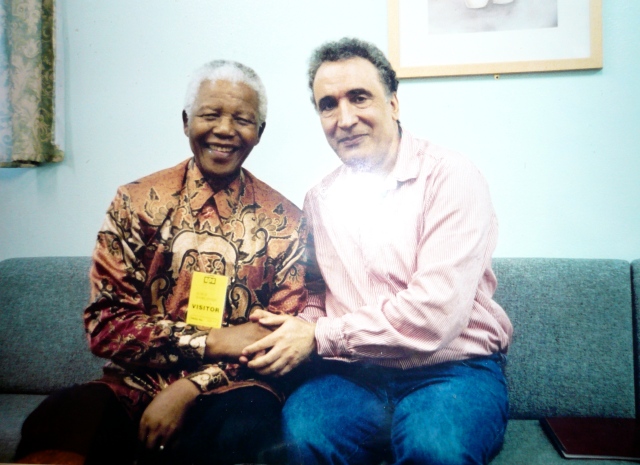[Diary of a Vengeance Foretold] Part 134
NOVEMBER 13 1988
“It would be immoral for me to abandon Libya after it had helped the ANC to fight apartheid which has been one of the most brutal systems in the world.”
President Nelson Mandela
Commenting on the victory of Vice President George Bush, South Africa state-controlled radio is reminding its listeners that Bush had opposed US imposition of economic sanctions against South Africa. But some officials are more carefull.
”A Bush victory does not mean that South Africa has escaped sanctions,” warns today South African Foreign Minister Roelof F. Botha pointing out that Democrats have made progress in both houses.
The Rebooking of the South African Delegation
In two recent pieces regarding the bombing of Pan Am 103, both Magnus Linklater in the The Times (“Lockerbie questions demand an answer”) and David Maddox in The Scotsman (“Was Lockerbie suspect working for the US?”) refer to senior South African figures being “hauled off” flight PA103. They are both uncorrect as former UK diplomat Patrick Haseldine pointed out in a comment posted on Pr. Black website.
According to a Reuters news agency report of 12 November 1994, a 23-strong South African delegation – including Foreign Minister Pik Botha, Defence Minister Magnus Malan and Military Intelligence Chief C J Van Tonder – were travelling by South African Airways from Johannesburg.
Their inbound flight inexplicably cut out a stopover at Frankfurt, which was SAA’s European hub, and arrived early at Heathrow.
The London embassy booked Botha and five of the party on Pan Am Flight 101 to New York for the signing of the Namibia Independence Agreement at UN headquarters on 22 December 1988. The remaining 17 members of the party returned from Heathrow on the SAA aircraft to Johannesburg.
UN Commissioner for Namibia, Bernt Carlsson, had been booked to travel by Sabena from Brussels, where he had addressed a Committee of the European Parliament, to New York for the same signing ceremony. However, Carlsson was persuaded by the South Africans to stopover at Heathrow to meet with officials of De Beers. Carlsson died on Pan Am 103.
“While it might be judicially and politically convenient now to shift the blame from the ailing Abdelbaset Megrahi to the dead terrorist Abu Nidal, we would be no nearer to the truth about the Lockerbie bombing. I continue to believe that, to get to the truth, a United Nations Inquiry into the death of UN Commissioner for Namibia, Bernt Carlsson, in the 1988 Lockerbie bombing is required. Let us hope that when the new US president takes office next January we will finally get this UN Inquiry,” argues Haseldine
SA Uranium Export and the EU3
I would like to take this opportunity to mention a story regarding the UN sanctions against South Africa. On Dec. 13, 1974, the General Assembly adopted Resolution 3295 (XXXIX). Here is a summary of this rather unambiguous text:
“The General Assembly…strongly deploring South Africa’s continued refusal to comply with the resolutions and decisions of the U.N., its continued illegal occupation of Namibia, its brutal repression of Namibian people and its persistent violation of their human rights, as well as its efforts to destroy the national unity and territorial integrity of Namibia…urges all States to take all possible economic and other measures with a view of compelling South Africa to withdraw immediately from Namibia…reaffirms the rights of Namibian People to permanent sovereignty over their natural resources and condemns the policy of those States which continue to support foreign economic and other interests engaged in exploiting the natural and human resources of Namibia in some case to the point of foreseeing the exhaustion of such natural resources…”
This resolution imposed that no one should extract or exploit Namibian resources without explicit approval from the Security Council. As is usually the case when an international legal instrument does not serve their economical interests, France, Germany and the UK simply ignored Resolution 3295.
In May 1981, France, Germany and the U.K. as well as the United States refused to participate in the International Conference concerning sanctions against South Africa.
Without these key countries on board, the sanctions were not worth the paper they were written on. South Africa remained one of the top commercial partners of the European Union, at the same level as Canada. Apartheid continued.
In October 1986, the United States Congress passed the Comprehensive Anti-Apartheid Act, which bans new investment in South Africa and new bank loans, except for the purpose of trade. The Act also prohibits exports to South Africa’s police and military and forbids the importation of a variety of South African goods, including farm products, textiles, steel and uranium.
The EU3 nations have demonstrated than when their civilian nuclear interests are involved, nothing is off limits, not even their sacred human rights.
“The Government of France, as many other Governments, does not recognize the legality of Resolution 3295,” said Jean-Francois Poncet, the Minister of Foreign affairs.
Members States of the European Union needed a safe supply of Uranium and their government would not let any human rights considerations interfere with an issue affecting their National Security. Paris and Pretoria signed an agreement concerning the delivery of 1,000 tons of uranium per year beginning in 1980.
“South Africa offers long term uranium contracts without the usual constraints, i.e. very different from the usual rules of pacific use of nuclear energy,” said a spokesperson of Synatomein.
In February 1979, M. Brunner, Head of the Energy Department of the EU Commission admitted that EU member states import on average 30 percent of their uranium form Pretoria. He refused to tell which percentage originated from Namibia, although there is little doubt that most of it did.
NOTES AND REFERENCES
Sanctions Squeeze South Africa — November 13, 1988
With Bush in the Oval Office, Is The C.I.A. ‘Back in the Saddle’? — November 13, 1988

